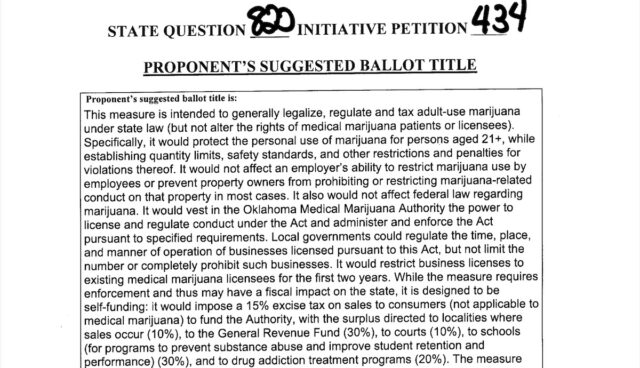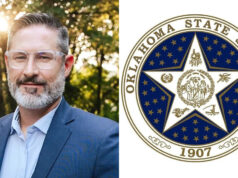
State Question 820’s day of judgment is coming Tuesday, March 7, as voters across the state head to the polls to decide if Oklahoma will join the list of states that have legalized adult cannabis usage.
If passed, SQ 820 would legalize cannabis use for adults 21 and up and expunge some past marijuana convictions. It would also generate hundreds of millions in added tax benefits over its first five years, according to those who favor the citizen-petition proposal.
But will it pass? There has been a dearth of polling. In October, Amber Integrated found SQ 820 leading 49 to 38 percent, but there have been no public polls released since.
In June 2018, SQ 788 established the state’s medical marijuana program and passed, 56 to 43 percent, performing well in Oklahoma City and Tulsa while holding its own in some of the state’s more populous rural counties.
Ahead of the election, pro-SQ 820 campaign organizers are confident they can assemble the same coalition that propelled SQ 788 to victory five years ago.
“We feel pretty good,” Yes on 820 organizer Michelle Tilley said. “We’ve seen steady support the whole way, and I think it’s holding pretty well. We’ve known all along it will come down to reaching voters and getting them to vote.”
Tilley said revenue and criminal justice reform are driving enthusiasm among “Yes” voters.
“I think what resonates with people is compassion for other human beings with the criminal justice reform, and I think the revenue piece is also something people have been excited about,” she said. “They’re excited about bringing this industry into the light with legalization and also generating tax revenue that can be used for schools and healthcare.”
But others are hoping Oklahomans say “No” to SQ 820, joining Arkansas, North Dakota and South Dakota as states that recently rejected recreational marijuana. The opposition campaign is led by longtime Oklahoma political consultant, pollster and lobbyist Pat McFerron who also led the fight against SQ 788.
“State Question 820 does more than just legalize marijuana. It really expands access, which will make it more publicly prevalent,” McFerron said. “When you look at the details — like a fine for smoking in public is $25, which is kind of a joke. It also prohibits cities from making their own rules. Then you have issues with child safety. Even down to child custody issues where if one parent uses marijuana and the other doesn’t want their child to be around that, the courts won’t back them up if 820 passes. There are a lot of problems with it.”
McFerron said SQ 820 is also opposed by many employers.
“I think the business community is really concerned about it because of the workforce issue,” McFerron said. “It would mean that on-the-job injuries would probably go up and it would make hiring more difficult. I also think there were people who voted for medical marijuana the last time around who feel like they may have been sold a bill of goods and that it hasn’t been delivered in the way it was advertised.”
Early voting at county election boards began today at 8 a.m. To review the ballot title and statutory proposal of SQ 820, click here.
Why SQ 820 could pass
Oklahomans have embraced weed: Since the state started its medical program, about 400,000 people have held medical patient licenses, which is roughly 10 percent of the state’s overall population.
Economic impact: An economic analysis from Vicente-Sederberg, a cannabis law and policy firm, on behalf of the “Yes” campaign found that SQ 820 could generate more than $821 million in tax revenue in its first five years. The proposal would establish a 15 percent excise tax on marijuana products, more than twice the current 7 percent tax rate on medical marijuana. The “Yes” campaign has made this one of its central themes. Vicente-Sederberg’s Andrew Livingston said during a recent media event that the economic benefits would be huge.
“Passage of State Question 820 would fuel economic activity, create jobs, and generate a new permanent stream of tax revenue for the state,” Livingston said. “Marijuana tax revenue is not a panacea, but it can support many critical government services that would otherwise go unfunded.”
Criminal justice reform: If passed, SQ 820 would end incarceration for low-level marijuana possession, and in some cases would expunge some records of past convictions for possession. Most Americans favor legalization in some form, and the criminal justice component is one reason why.
“I think the number one thing that resonates with people has been the compassion for other humans,” Tilley said. “They don’t believe individuals should be put in jail for cannabis use because it’s an outdated practice that needs to end. We’ve all heard stories about people who get in trouble for marijuana, which is their introduction to the criminal justice system which can cost people their livelihood. I’ve spoken to people who don’t even use marijuana anymore who are going to vote ‘Yes’ solely for the criminal justice part.”
The campaign: The “Yes” campaign has been organized for more than three years, having tried and failed to get legalization on the ballot before. It’s well-funded, with TV ads going on the air and mailers and door knockers deployed across the state. If enthusiasm matters in a low-turnout election, the organization could put SQ 820 over the top.
“We’ve had a great response wherever we’ve gone across the state,” Tilley said. “I just sent a bunch of yard signs and walking cards to Guymon.”
Why SQ 820 could fail
Low voter turnout: It’s early spring, winter sport playoffs are underway across the state, and spring break is about to happen for thousands of families across Oklahoma. Perhaps getting to the polls to vote to legalize marijuana may not be many people’s top priority. Special elections in the middle of odd-numbered election years don’t typically generate as much interest and excitement as fall general election campaigns do. Low voter turnout could, in theory, favor the “No” campaign.
“That’s probably the one thing that we worry about,” Tilley said. “We’ve done everything we can to get the vote out, it just comes down to who shows up.”
Crime and rural tumult: In December, four people were murdered at a marijuana grow operation in Kingfisher County. The “No” campaign has used incidents like this to highlight a crime problem they say is associated with the marijuana industry. Grow operations, black market or legal, also tax rural water and power resources. And beyond that, not everyone is happy to drive down a city street lined with dispensaries.
“I think people recognize that we don’t have a handle on the medical marijuana industry,” McFerron said. “The Wall Street Journal called Oklahoma one of the biggest black-market states in the country. We have rural areas that have seen high-profile execution murders in Hennessey, and there is also the issue of foreign land ownership and the strain on water and electric grids in some places.”
As expected, law enforcement has largely opposed SQ 820. Cleveland County District Attorney Greg Mashburn and Tulsa County DA Steve Kunzweiler have spoken out against the proposal, as have several sheriffs and police chiefs across the state. Oklahoma City Police Chief Wade Gourley also opposes SQ 820.
“Oklahoma will be hurt by increased access to marijuana,” Gourley said in a statement. “Our mental health professionals confirm that the use of today’s high THC product leads to psychoses and schizophrenia, two diagnoses that are directly tied to homelessness.”
The no campaign has also made children’s health one of its key issues.
Weed fatigue and the silent majority: At times in November, some polls showed Gov. Kevin Stitt’s bid for a second term in peril. In the end, he rolled to re-election without breaking much of a sweat thanks in part to strength among rural voters.
With Stitt and 39 Republican senators opposing SQ 820, it’s possible the same dynamic plays out on March 7. While a lot of Oklahomans have embraced the cannabis industry, not everyone is as excited to drive down a street lined with dispensaries. For a segment of voters, it may be too much too soon.





















